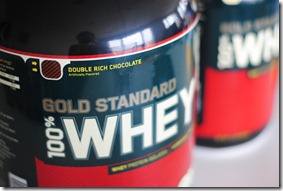Which Protein Powder Is Best?
Protein powder is just protein in powdered form. The protein is simply extracted from natural foods like eggs, milk, or soy, meaning that there is typically little or nothing artificial about it!
Different types of protein powder:
- Whey protein – Whey Protein is the most popular and common form of protein powder, and it’s derived entirely from milk. This means that it contains at least trace amounts of lactose (really only important if you’re lactose-intolerant), although many protein powders contain the enzyme lactase in order to aid digestion of the lactose.
Advantages of Whey Protein: The two biggest advantages of whey are that it’s usually cheaper than other options and it tastes a lot better! This is why I buy it.
There are hundreds of different brands of whey protein powder, but every brand is typically either whey concentrate or whey isolate. Realistically, both concentrate and isolate will work about the same, but whey isolate contains more protein and less fat than whey concentrate. The primary thing you should pay attention to is that there are no added sugars in whatever brand of whey protein you buy.
Recommended Whey Protein Brands: Optimum Nutrition 100% Whey Gold Standard (this is the one I get in the double rich chocolate and vanilla ice-cream flavors); Pure Protein 100% Whey Protein (get the frosty chocolate flavor and not the the vanilla one).
- Egg protein – Egg Protein, as you guessed, is derived from eggs. When compared to whey protein, egg protein contains slightly fewer calories, fats, and carbohydrates, although it contains quite a bit more sodium.
Advantages of Egg Protein: In addition to having fewer calories and carbs, egg protein is a great alternative to both casein and whey if you are lactose-intolerant. In addition, egg protein digests more slowly than whey protein, which means that it will keep you full for longer.
The primary downside to egg protein (at least for me) is that it tastes very salty and rather disgusting if used with coconut milk or regular milk. The only way I can personally drink egg protein shakes is if I add just water, in which case the taste is a bearable but not delicious mixture of salt and chocolate (I buy the chocolate flavor).
Recommended Egg Protein Brands: Optimum Nutrition 100% Egg Protein (I have tried the rich chocolate flavor); Now Foods Eggwhite Protein Powder (this pure eggwhite powder so it’s not flavored at all, which means you have to add something else into the shake to make it taste good, but some people use it as a substitute for egg white in cooking rather using it for protein shakes).
- Casein protein – Milk contains 2 forms of protein. Whey is the first (around 20% of proteins in milk are whey), and Casein is the other (80% of protein in milk are casein). In fact, casein is what causes milk to have that white opaque look.
Advantages of Casein Protein: The main benefit of casein versus whey or even egg protein is that casein is absorbed more slowly by your body, so you stay full for longer. If you’re concerned about insulin spikes, this will also help to slightly reduce your post-meal insulin spike.
The biggest disadvantages to casein protein are that it is usually not suitable for those with lactose-intolerance, and there are also some people who are allergic to casein itself. In addition, I’m not a big fan of the taste and texture of casein. Like egg protein, casein contains more sodium than whey, which results in a more salty flavor to the protein shakes. Also, casein makes the shakes very thick (but in an almost gluey way rather than in a milkshake way).
Recommended Casein Protein Brands: Optimum Nutrition 100% Casein Protein (I tried the chocolate supreme flavor).

